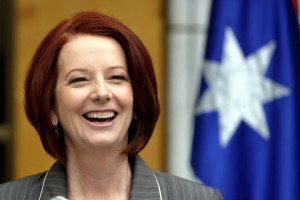Julia Gillard is a trailblazer in Australian politics, and because of her work, is today a household name around the world. In 2010 she became the first woman to lead the Australian Labour Party (ALP), following this up by becoming the first woman to be voted in as Australia’s Prime Minister. She held this position until 2013; today she is one of the foremost experts on education, focusing specifically on how it can empower girls around the world.
Gillard received degrees in law and arts from Melbourne University. Throughout her time in education she was involved in politics, including participating in Student Government as well as becoming President of Australian Union of Students. After she graduated she began practicing law while maintaining an interest in politics by being a member of the ALP. She served as President of the Carlton branch for four years before being elected to serve in the House of Representatives in 1998. From there her career grew quickly; in 2001 she was given the shadow portfolio of population and immigration, meaning¬†she was responsible for creating the opposition party’s (ALP) opposing policies as well as acting as a spokesperson for that particular issue. In 2003 she was given the shadow health portfolio, and following the 2007 elections she was named as Prime Minister Paul Rudd’s deputy as well as being named as the Employment and Workplace Minister.
During his time as Prime Minister, Rudd was unable to implement many of the policies that he had promised; he also aimed to bring in a “super tax” on the wealthy mining companies in the country. This proved to be incredibly unpopular and as a result he faced a leadership challenge from Gillard which she won and in 2010 she was sworn in as Australia’s first female Prime Minister. In her first year in power she faced a number of challenges including serious flood damage in the east of the country as well as being unable to pass new laws in relation to immigration. Perhaps Gillard’s most important moment as Prime Minister came in 2012 when she gave her infamous “misogyny speech”. During this speech in parliament she accused the Leader of the Opposition of sexism and misogyny, not only in relation to comments he had made about her but also in relation to the women of Australia. She used direct quotes that showed his views on women were outdated and clearly misogynistic. It was a moment that won her a legion of new supporters internationally.
Despite the success of her speech she faced a leadership challenge from former Labour leader Rudd and in 2013 she was ousted as leader of the ALP and stood down as Prime Minister. Since retiring from politics she has written a book about her life as well as joining the Global Partnership for Education (GPE) which works with developing countries to improve their education system and improve attendance figures, especially for girls.
-Michelle O’Brien
Junior Girl
Girl Museum Inc.

